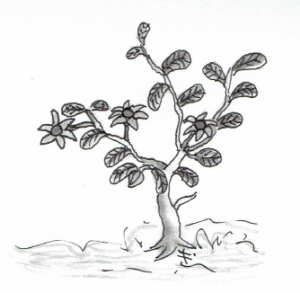Difference between revisions of "Blue Star"
From World of Entorais Wiki
Jump to navigationJump to search (applied template) |
m (content) |
||
| Line 1: | Line 1: | ||
[[File:Blue_star.png|thumb|right|200x|Blue Star]] | [[File:Blue_star.png|thumb|right|200x|Blue Star]] | ||
==Description== | ==Description== | ||
;Common Names: | ;Common Names:Blue Star | ||
;Classification: | ;Classification:Woody, Flower | ||
A rare plant of forested areas, this small woody plant grows to a height of about 20 cm (8 inches) and produces its namesake six-pointed star-shaped flowers of a sky blue hue. The bark of this plant can help regulate an irregular heartbeat, and has strong stimulant qualities. The juice pressed from the leaves is mildly antibiotic, and finds use in many medicinal washes and ointments. The roots are used to treat tremors and other nervous disorders. | |||
==Ecology== | ==Ecology== | ||
;Rarity: | ;Rarity:Uncommon in temperate or Sub-artic regions, rare in sub-tropical and arctic regions | ||
;Distribution: | ;Distribution:forests and savanna | ||
;Life Cycle: | ;Life Cycle:perennial, flowering in early summer, producing trios of brown bead-like seeds | ||
==Uses== | ==Uses== | ||
;Cultivation: | ;Cultivation:Many herbalists will cultivate blue star as a regular medicinal plant in their private gardens, due to its versatility. | ||
;Culinary: | ;Culinary:none | ||
;Medicinal: | ;Medicinal:cardiac (bark), stimulant(bark), antibiotic (leaves), antispasmodic (roots) | ||
;Other:<!-- other uses--> | ;Other:<!-- other uses--> | ||
Revision as of 21:36, 4 February 2019
Description
- Common Names
- Blue Star
- Classification
- Woody, Flower
A rare plant of forested areas, this small woody plant grows to a height of about 20 cm (8 inches) and produces its namesake six-pointed star-shaped flowers of a sky blue hue. The bark of this plant can help regulate an irregular heartbeat, and has strong stimulant qualities. The juice pressed from the leaves is mildly antibiotic, and finds use in many medicinal washes and ointments. The roots are used to treat tremors and other nervous disorders.
Ecology
- Rarity
- Uncommon in temperate or Sub-artic regions, rare in sub-tropical and arctic regions
- Distribution
- forests and savanna
- Life Cycle
- perennial, flowering in early summer, producing trios of brown bead-like seeds
Uses
- Cultivation
- Many herbalists will cultivate blue star as a regular medicinal plant in their private gardens, due to its versatility.
- Culinary
- none
- Medicinal
- cardiac (bark), stimulant(bark), antibiotic (leaves), antispasmodic (roots)
- Other
